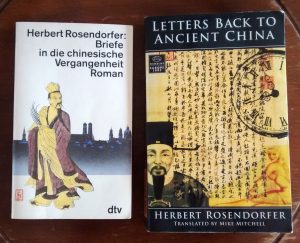Some time ago on Twitter, another translator shared her dislike of conservative dystopian future fiction. I’d never thought to divide that particular genre into liberal and conservative subcategories, but it’s an interesting exercise. I suppose the former is driven by fear of oppression and/or a backlash against progress (see The Handmaid’s Tale) and the latter by a belief in the futility of utopian projects and the irrepressibility of certain inconvenient elements of human nature (see Love in the Ruins). 1984 and Brave New World defy easy categorization, although BNW has some notably “conservative” elements, exemplified by the sad fate of John the Savage.
Around the same time I ordered a book by Herbert Rosendorfer because one of my regular clients was described as writing in a similar style to his. So it seemed like a good idea to study one of his novels in German and English. I found these two at Abebooks for a total of $6:

Letters Back to Ancient China turned out to be conservative dystopian future fiction with a twist, namely that the dystopian future is the author’s present.
The narrator is a time traveler from 10-century China who finds himself in Munich ca. 1983. He tells the story in letters to his friend who stayed behind. For the most part, he is unimpressed. With a clear Confucian eye he diagnosis our modern society as a pointless project oriented towards its own destruction.
That a European author would choose a Chinese traditionalist as the character who sits in judgement on the modern West is not as strange as it might seem. Conservatives of a certain stripe love Chinese tradition, or at least their conception of it. I used to be in touch, via Facebook, with a Christian writer, conservative in the broad (non-GOP) sense, who posted a lot about Confucius and admired Chinese culture generally. “Ah well,” he would say when despairing of the way our culture was headed, “There will always be a China.” A freethinking American friend of mine who happened to have Chinese in-laws became his Facebook “friend” but couldn’t stomach his uncritical Sinophilia; there were periodic verbal fireworks and, ultimately, an unfriending. I think of this incident fondly as the only time I’ve seen a social-media relationship break down over Confucius.
Anyway, if unlike the translator mentioned above you do like conservative dystopian future fiction, this is a good one to check out. The English translation by Mike Mitchell, published by Dedalus Europe in 1997, is faithful and reads well.
PS – I no longer use Facebook. How about we all leave and let the behemoth starve to death? It would be a well-deserved fate.
Interesting. Maybe I’m missing something, but I don’t associate this genre with German literature anyway – certainly can’t think of any examples off the top of my head (until this one). Also, German lit doesn’t seem to have a big science fiction tradition, surprising perhaps given all the German contributions to science and philosophy.
The use of a non-Western observer to pass judgment on the foibles and failings of the West seems to be firmly in the tradition of Montesquieu, whom many conservatives admire.
Indeed – “Persian Letters” (which I admit I haven’t read) came to my mind while reading this.